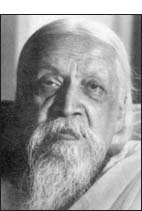

There are some persons who act as a bridge between two periods, but there are some who cannot be bound within a period and leave their impression on the sands of time forever. The life of Sri Aurobindo is an example of such a person. Wherever he went, he left an indelible mark. His works and philosophy have not only inspired Indians but also the world.
It is sheer coincidence that he was born on 15 August 1872, the same day India gained independence some 75 years later. On the occasion of his 75th birthday, he gave a message which formed the dream of his life:
There will be a period of renaissance in Asia and Asia will again act as a guiding light for human civilisation.
India will be a spiritual guide for the rest of the world.
There will be progress towards man’s ultimate development and he will become capable of solving his problems himself.
Aurobindo Ghosh was the third son of Dr K.D. Ghosh and Swarnlata Devi. Influenced by Western culture, his father converted to Christianity. He had studied in England, so he sent his three sons to study at Loretto Convent in Darjeeling for their primary education. After two years, the father went to England and left his children at Manchester, where they studied at St Paul’s School. Here Aurobindo studied English, French and Latin. At the age of 10, Aurobindo wrote poetry, which was published in Fax Family Magazine. Aurobindo took admission in King’s College at Cambridge and also cleared the written examination of the Junior Civil Services, scoring the highest in Latin and French.
A group of Indian students had formed a secret organisation called ‘Lotus and Dagger’ that worked clandestinely for the Indian freedom struggle. Aurobindo became a member of the organisation. He gave fiery speeches and recited patriotic songs at the congregation of Indian students called Indian Majlis in Cambridge. It was during these days that Maharaja Sayajirao of Baroda went to London and invited him to work in his kingdom. In 1893, he went to Baroda. His father died the same year. Aurobindo taught English and French to the maharaja. Later he became the principal of Maharaja College at Baroda.
After nearly 14 years in Baroda, he went to Calcutta in 1905, when Lord Curzon partitioned Bengal. Between 1902 and 1910 he strived vehemently to free the country from British rule. He made revolutionary ideas known to the people. He disagreed with the Congress policy of sending petitions and strongly supported the extremist wing of the Congress led by Bal Gangadhar Tilak. His association with the Congress in Calcutta for five years gave a lease of life to the party and it began to penetrate the grassroots level. But God had willed otherwise.
In 1910, when he went to prison, it dawned on him that his area of work lay elsewhere. Listening to the voice of his conscience and God, he forayed onto the path of spiritualism — which he considered the original gift of India to the world.
The British Government considered him a revolutionary. So to get away from the clutches of the British and to carry out his work without any obstacles, he went to the French colony of Chandranagar before moving on to Pondicherry, where he established an ashram for meditation and stayed there for the rest of his life.
According to Aurobindo, freeing man from the bonds of individuality would help mankind achieve moksha (salvation). He tried to bring about the union of different spiritual streams. He established a number of ashrams and founded Auroville along with a French lady Mira Richard, later known as ‘the Mother’. Auroville is not just an ashram, it is a self-sufficient township, where people from all walks of life and different countries get a new life and work for the progress and betterment of mankind. Aurobindo died on 5 December 1950.